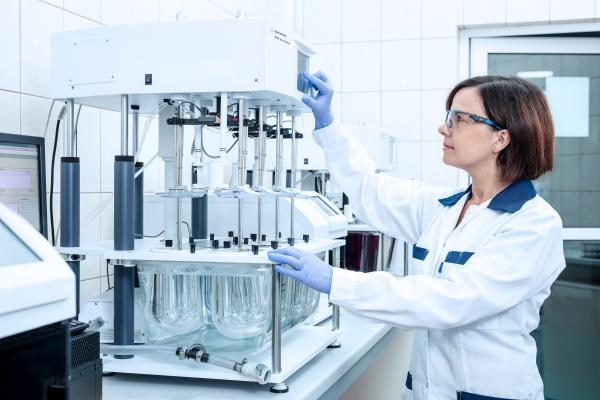
- The EIB is financing the company’s research operations in a variety of therapeutic areas at its laboratories in Poland.
- The investments are to be made by 2023 and will help develop jobs for highly-skilled workers.
The European Investment Bank (EIB) is supporting Polpharma – the leading Polish pharmaceutical company – with a loan of up to PLN 300 million (approx. €65 million) to finance its research, development and innovation programme (RDI) until 2023. The investment will strengthen the company’s position by the development of its portfolio of new products and will also provide patients with broader access to modern medicines in several therapeutic areas, including cardiology, diabetes, ophthalmic and respiratory diseases.
As a key company in the pharmaceutical sector, Polpharma has a strong focus on RDI. One key factor which makes the company stand out is its capacity to produce generic medicines with added value, thus offering treatment alternatives to patients in Europe. The project, which is to be implemented in the company’s research laboratories in Poland, will contribute to maintaining and creating jobs for highly-skilled employees. Through the cooperation between Polpharma and educational institutions, the knowledge acquired by the company during its research activities will be shared widely throughout Europe.
EIB Vice-President Teresa Czerwińska, who oversees operations in Poland, said: “Support for R&D has always been a priority for the EIB Group. We are therefore particularly pleased to have the opportunity to work with Polpharma. The development and production of medicines involves multiple steps, such as the optimisation of production processes or large-scale clinical studies. In projects of this nature and risk profile, the diversification of funding sources, the long repayment periods and the favourable terms that the EIB offers are exactly what attracts companies like Polpharma. By supporting innovative research in new medicines and treatment methods, we hope to contribute to improving the health of patients in Poland and in Europe.”
Wojciech Rosa, Board member of the Polpharma Group, added: “Polpharma's purpose is to help people live a healthy life in a healthy world. A key role in our activity is played by the development of modern pharmaceutical products that respond to contemporary health challenges, ensure drug security and expand access to effective therapies for patients in Poland and Europe. Cooperation with the EIB will help us effectively implement our long-term development plans and innovative patient-friendly solutions as well as create attractive jobs for the best specialists.”
This long-term loan – the second granted to Polpharma by the Bank – reflects the EIB’s involvement in supporting RDI. Innovations and developing skills are fundamental components of balanced growth and the creation of jobs requiring high levels of expertise. Both components will play a key role in the economic recovery following the COVID-19 crisis and will promote long-term competitiveness. That is why innovation funding is one of the EIB’s main priorities (more on EIB’s activity for innovation here).
The RDI strategy which is to be introduced in the years to come will strengthen Polpharma’s position in the international pharmaceutical sector and drive the company’s medium-term development strategy, enabling it to roll out its investment plan with greater flexibility and assurance.
Background information
Polpharma is one of the leaders of the Polish pharmaceutical market, and one of the leading medicine producers in Central and Eastern Europe, the Middle East, Central Asia and the Caucasus. The company was founded in 1935. Through dynamic development, foreign expansion and capital investments, Polpharma became a strong, international pharmaceutical group employing over 7 000 people and providing modern medicines and innovative developments for patients and business partners throughout the world. The group’s factories produce around 400 million medicine packs each year, which are used to help people in 35 countries. In turn, pharmaceutical products go to more than 60 countries, including such advanced markets as the United States, Japan and Korea.


